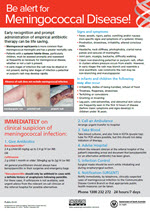PDF 162 KB
Reporting form for notifiable diseases as per the South Australian Public Health Act 2011
Invasive infection with Neisseria meningitidis (the meningococcus) frequently manifests as either septicaemia or meningitis. Meningococcal septicaemia is more common than meningococcal meningitis and has a higher mortality rate (5 to 10%).
Invasive meningococcal infection should be considered in the differential diagnosis of any systemic febrile illness in any age group.
If a doctor considers that a patient with a non-specific febrile illness does not require referral to a hospital, the doctor should advise the carer to keep the patient under frequent and regular review and seek immediate medical attention if the patient subsequently deteriorates in any way or develops a rash.
Clinical presentation of invasive meningococcal infection may include the following:
In early stages of infection the rash may be atypical or not present. In meningitis unaccompanied by bacteraemia a rash may never occur. The classic presentation is of non-blanching petechial or purpuric rash, often in clusters that may first appear where pressure occurs from elastic. However, the rash may blanch and resemble a viral exanthema or be a non-blanching maculopapular rash.
In infants and children the following may also occur:
Benzylpenicillin should be given immediately on suspicion of invasive meningococcal infection.
Benzylpenicillin should preferably be given intravenously (IV) but if unable then give intramuscularly (IM). Use: benzylpenicillin 2.4 g (child: 60 mg/kg up to 2.4 g) IV or IM.
Benzylpenicillin should not be used if there is a clear history of anaphylactic or immediate penicillin hypersensitivity reaction (such as difficulty breathing, angioedema or generalised urticarial rash). Such patients should be discussed with the on-call clinician at a referral hospital. Most people who report penicillin allergy do not have such a history and can safely be given benzylpenicillin.
Ceftriaxone 2 g (child 1 month or older: 50 mg/kg up to 2 g)IV or IM is an acceptable alternative to benzylpenicillin for empirical treatment prior to transfer to hospital. Ceftriaxone is suitable in patients hypersensitive to penicillin (excluding immediate hypersensitivity).
Patients who may have invasive meningococcal infection should be transferred urgently to hospital by ambulance.
Benzylpenicillin 2.4 g (children: 60 mg/kg up to 2.4 g) IV every 4 hours plus either
Antibiotics should not be delayed while initiating or awaiting results of diagnostic tests.
Tests you need to take include:
Droplet precautions (in addition to standard precautions) should be used until the completion of 24 hours of appropriate systematic antibiotics.
The Communicable Disease Control Branch, South Australia, should be notified on suspicion of invasive meningococcal disease on 1300 232 272 (24 hours, 7 days) to enable prompt public health follow up of close contacts for prophylactic antibiotics and information.
Meningococcal ACWY vaccine is available and is on the National Immunisation Program.
A vaccine against serogroup B is registered in Australia.
In some cases meningococcal infection has serious long term sequelae or is fatal. Doctors are urged to provide appropriate counselling or refer people to suitably qualified counsellors.
 A poster for use in emergency departments (PDF 449KB) that provides information on the clinical presentation, treatment, laboratory tests, infection control and notification of invasive meningococcal infection.
A poster for use in emergency departments (PDF 449KB) that provides information on the clinical presentation, treatment, laboratory tests, infection control and notification of invasive meningococcal infection.
A desktop card for use in general practice surgeries (PDF 455KB) that provides information on the clinical presentation, treatment, laboratory tests, infection control and notification of invasive meningococcal infection.
An information resource for patients about invasive meningococcal infection detailing the clinical presentation, incubation period, infectious period, treatment and control of spread.